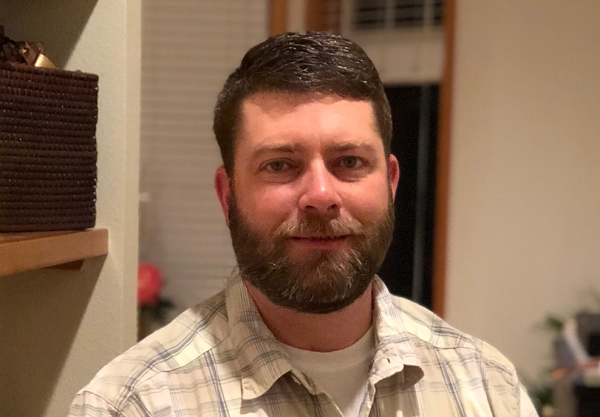Learn more about Monarch Recovery, a women’s sober living option in Lakewood, CO.
Author: Christy Weeks
Residential Evaluation and Detoxification: Aaron’s Story

Hear how one man’s experience in Harmony’s RED program helped put his recovery safely back on track.
Hazelbrook Sober Living
Conrada “Bunni” Jauregui Shares Her Gift of Recovery

After being “out there” for many years, running amuck with my addiction, turning my back on “life and my family” it was time to turn my life around and what better time than the holidays. It was the perfect “gift” I could give myself and my family. Holidays were not always festive when I was in my active addiction. I spent little time with my family and more time with friends drinking and using.
My “norm” became a bottomless pit of darkness, I couldn’t see anything but black surrounding me and my addiction was putting me in harm’s way. I needed help. I needed “to change” no matter what. So when the opportunity came up for me to go to treatment, I went willingly.
I entered treatment at Harmony on December 16th a few weeks before the holiday season. I was excited to leave California and go to Colorado. Even though I was “high” when I arrived in Colorado, I remember the beauty of the mountains and the snow and how I felt like I could get better here. I knew that it was going to require sacrifice if I was going to get better, including letting go of Thanksgiving, Christmas and even New Years. This was my time to get well, and my family’s time to rest and know I was someplace safe.
Being in treatment during the holidays wasn’t so bad. Harmony made the experience special. They provided us with presents on Christmas morning, we decorated and I shared my early recovery with new friends.
My family is important to me but I needed to feel and learn that I was most important. Everyone’s road to recovery is different. Making this decision to stay in treatment was a rare opportunity for me to turn my life around. So I surrendered to all my short comings, the time away from my family, and decided to become the most important reason to get sober.
Today, my sobriety is the reason why my life is so rich and vibrant. My willingness to look back at the short-term sacrifice of being in treatment during the holidays contributed to helping me get my family back again. This year, I can celebrate the joy of the season healthy and full of gratitude, knowing that this gift of recovery continues to bless me and all those I love.
As we approach the holiday season and you are reading this testimonial, know that you are worth every bit of happiness “sobriety” offers. Don’t wait until after Thanksgiving, Christmas or the New Year to make this change in your life. Do it now so that you can experience the countless holidays to come that are free from the pain and suffering of addiction. Give that gift of recovery to yourself and to your family. I did and it was the best gift ever!
Recovery during the Holidays. Watch one woman’s story of hope.
Harmony Foundation Responds to the Opioid Epidemic with HOPE

by Christopher Reveley, MD, and Annie Peters, PhD, LP
The Opioid Epidemic
According to the National Institute on Drug Abuse (NIDA), nearly 100 people die from opioid overdose in the United States every day, and 2.6 million Americans struggle with opioid addiction. The prescribing of opioid pain relievers became much more common in the late 1990s, and it soon became evident that these medications were powerfully addictive. Opioid overdose deaths have increased significantly in the years since. Many of those addicted to heroin started with the abuse of prescription opioids.
Overdose along with the spread of HIV, hepatitis C, and withdrawal syndromes in babies born to addicted mothers constitute a nationwide crisis that has overwhelmed the resources of state and local health care delivery services. Recently, the White House identified the opioid epidemic as a national public health emergency.
How is Harmony Responding to Opioid Epidemic?
Harmony Foundation in Estes Park, CO, has been treating addiction for 48 years and has fostered a generation of long-term recovery support for individuals and families. Harmony’s mission is to provide the foundation for sustained recovery from the diseases of drug and alcohol addiction. Harmony staff is committed to continuous improvement and closely monitors a client experience, treatment response, and the research literature on addiction treatment. In the field of opioid addiction research, advances in behavioral treatment, neurobiology, and brain imaging have given treatment programs guidance in developing better services. Harmony now offers HOPE – Harmony’s Opioid Programming Experience. HOPE is offered to all Harmony clients with opioid use disorders. The program involves enhanced medical, counseling, and case management services specifically tailored to meet these clients’ unique needs.
HOPE: Medical and Clinical Approaches
HOPE begins with thorough medical and psychological evaluations. Collaboration with the client, members of the interdisciplinary team and, when appropriate, family and referral sources, determine the most effective treatment plan. All HOPE clients are invited to participate in weekly Opiate Support Groups led by a professional addiction counselor. This group addresses the unique challenges of early opioid recovery, including uncomfortable physical and psychological symptoms, cravings, and strategies to avoid rapid relapse. In this setting, clients support each other and are educated about the process of recovery.
Harmony has provided all clients with medication-assisted treatment (MAT) for many years. This combination of education, counseling, and the use of medication in early recovery is part of the Harmony philosophy. HOPE expands MAT to include medications that alter the physical response to opioids, reduce craving, and give the individual time to heal from the psychological, social, and spiritual wounds of addiction.
HOPE clients may choose to avoid medications altogether or use only sleep and anxiety-reducing medications during the acute withdrawal period. For others, naltrexone, an opioid receptor blocker, can prevent the euphoria of opioid use and help control cravings, thereby changing the client’s drive to use illicit opioids after treatment.
Buprenorphine
This partial opioid agonist, administered in a tapering protocol, may be chosen by the treatment team and client to ease symptoms of severe opioid withdrawal during detoxification. On an individual basis, this medication may be continued during early recovery, most commonly for those with severe and persistent opioid addiction. Care following residential treatment may include ongoing buprenorphine to provide a craving-free foundation for the client as they rebuild damaged interpersonal and work relationships and regain physical and emotional health. The ultimate goal with all treatment approaches is complete abstinence from all opioids.
While some may question how an opioid medication (buprenorphine) can help someone recover from opioid addiction, this treatment approach is supported by organizations such as the World Health Organization, the American Society of Addiction Medicine, the Substance Abuse and Mental Health Services Administration, NIDA, the Veterans’ Administration, NAADAC – the Association for Addiction Professionals, and the National Association of Addiction Treatment Professionals. Due to the number and quality of research studies that have been completed on the use of buprenorphine in treating opioid use disorders, the level of evidence for the effectiveness of buprenorphine treatment is considered to be high (Thomas et al., 2014). Positive outcomes typically include improving retention in treatment and reducing illicit opioid use.
The Harmony care team works closely with clients who choose to include buprenorphine in their treatment strategy. This will typically involve full participation in HOPE and a recommendation for participation in Harmony’s Transitional Care Program (TCP), an intensive, 90 day intensive outpatient program coupled with monitored sober living and medication management by Harmony providers. When clinically indicated or to accommodate client preference, Harmony’s case managers may refer clients to other programs with similar services.
If you or someone you know is struggling with opiate addiction and needs help right away, Harmony is here to help. Call us at 866-686-7867 and one of our admissions specialists can discuss next steps.
References
https://www.drugabuse.gov/drugs-abuse/opioids/opioid-crisis
Center for Behavioral Health Statistics and Quality (CBHSQ), 2016. 2015 National Survey on Drug Use and Health: Detailed Tables. Rockville, MD: Substance Abuse and Mental Health Services Administration.
Thomas, CP, Fullerton, CA, Montejano, L, Lyman, DR, Dougherty, RH, Daniels, HS, Ghose, SS, & Delphin-Rittmon, ME. Medication-assisted treatment with buprenorphine: Assessing the evidence. Psychiatric services, 65(2), 158-170.
Kolmac Outpatient Recovery Centers
Jill Lopez, CIP – Intervention Path to Recovery
Webinar Series: Failure to Launch

Presented by: Elizabeth Olson, Psy.D., LCSW
In this webinar, Dr. Olson will review common causes that contribute to the difficulties that some young adults experience launching into independence. Young adults encounter many challenges that interfere with their ability to launch into academic studies, career pursuits, and independent living skills. Effective strategies for parents will be discussed to assist parents in developing healthy boundaries, encouraging young adults to find their voice and follow their interests, and exploring how to let young adults fail forward. Parents are charged with the delicate task of relationally guiding their young adults while allowing them to become their own person, independent of the family. Unconscious parental motivations that tacitly interfere with the ability to launch will be explored. Aspects of the young adult brain are important to consider in order to understand how best to intervene. Parents will come away from this course with a better understanding of how to parent a youth who is struggling to launch and how to encourage the successful launch of kids who have yet to encounter this important developmental milestone.
WHEN: November 15, 2017 12:00pm – 1:00p
COST: Free
1.0 CEU pending
REGISTER HERE
Sobriety 1st
Sobriety 1st provides day treatment, IOP, and RP/GOP to individuals who require a high level of therapeutic structure and accountability.
Nicoletti-Flater Associates
Nicoletti-Flater Associates specialize in police and public safety psychology, crisis intervention, trauma recovery, and violence prevention.

